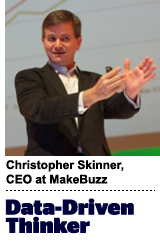 “Data-Driven Thinking” is written by members of the media community and contains fresh ideas on the digital revolution in media.
“Data-Driven Thinking” is written by members of the media community and contains fresh ideas on the digital revolution in media.
Today’s column is written by Christopher Skinner, CEO at MakeBuzz.
It’s all about the data, right? At least that’s what everyone says about digital media.
In today’s LUMAscape-driven world of data-driven marketing, getting your hands on differentiated data makes the difference between delivering mediocre performance for brands and becoming a “must buy.” Google and Facebook have cracked the code of digital marketing, mostly because they get more data than the brands themselves. However, in the case of display marketing where commoditized cookies are king, getting access to first-party data and knowing how to leverage it is what separates the ad-tech men from the boys.
But who is getting the client data these days – and what does data access portend for the future of digital marketing? Let’s look at two types of data, and who gets access to them:
Media Data
When a digital campaign runs, the data collected, such as audience, content, performance and pricing data, is always closest to the vendors. The DSPs, publishers, data providers and DMPs get the data first. Agencies also get campaign data but are often at arm’s length from the real data, and sometimes only get an aggregated or delayed view of granular performance data. Unless you control the “pipes” through which programmatic media runs, you are never going to be the first to know. Vendors don’t trust agencies with raw data feeds, and certainly do not trust agencies to safeguard their client data and not leverage it in wider use.
In a world where first-party data is king, agencies seem to be at arm’s length from the information that really matters. For example, when you see Babs Rangaiah talk about the partnerships Unilever has created to engage digital consumers, you see big, deep engagements with publishers and platforms like Twitter and Facebook – the publishers that are closest to their users’ data.
Sales Data
What about first-party sales data? That’s the real gold. Facebook didn’t get truly interesting for CPG marketers until Datalogix used offline sales data to prove that its campaigns could move soap from store shelves. Point-of-sale data, combined with CRM data, is getting mixed into data-management platforms and helping marketers target consumers with the right message at the right time – the holy grail of marketing that we were promised 18 years ago when the first banner ad launched.
So, who is getting this data? It is certainly not the agencies. They might give hashed CRM files over to a retargeting company, or even provide some cookie data for a “lookalike” campaign, but real sales data stays in the client domain.
But it’s more than sales data that keeps agencies and media vendors at bay. To get a seat at the boardroom table and really be a partner, the conversations start to become about not just growing awareness, but about growing revenue. How can media move the sales needle, drive profits and optimize corporate efficiency? Where do the new customers need to come from, and what existing customers can spend more? Those are the questions that, if answered, really move the needle. Clients are not even having those conversations with their largest and most strategic media partners.
Who?
So, who can have those conversations? If not the agencies or the media vendors, then it’s management consulting firms. The McKinseys and IBMs of the world are used to looking at deep client data, including sales and CRM data. They are also good at talking at the board level, and understand how marketing tactics can impact the P&L. They don’t have a stake in the media game, either.
If you look at the drawing above, it’s clear that consultants can get their hands on both media data and client data directly – where they are in the perfect position to make recommendations that can impact a brand’s real P&L challenges. It’s hard to argue that agencies or big media platforms can put themselves in such a position, especially given the challenges around media arbitrage, and the inherent conflict of interest that engenders.
Look at some recent consulting and digital agency tie-ups. Agencies like Olsen, which recently acquired PulsePoint, an Austin, Texas-based firm, are looking at acquiring management consultancies so they can get closer to the boardroom. Conversely, Deloitte’s acquisition of Banyon Branch, a digital marketing specialist, looks to match boardroom strategy with digital and social media execution.
Want to make a bet on the future of digital media? If you think having access to client and media data makes all the difference, then I would go long on management consulting firms – or a new breed of media consultant that can get access to the data that really matters.
Follow MakeBuzz (@MakeBuzz) and AdExchanger (@adexchanger) on Twitter.














